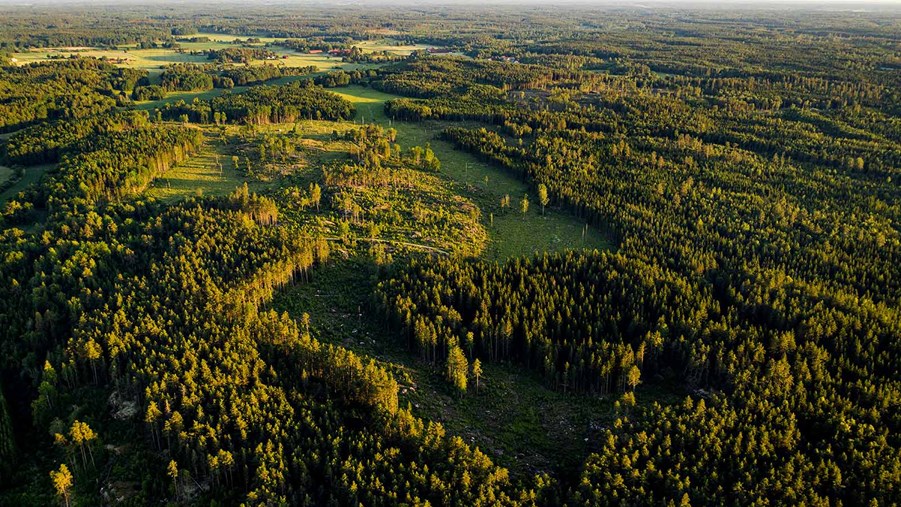
The EU has adopted 2030 carbon sink targets for land use and forestry. The Swedish Forest Industries Federation (SFIF) believes that a new approach to the LULUCF sector’s contribution to climate policy objectives is needed. Climate policy needs to focus on eliminating the use of fossil resources, not on forest carbon sinks to compensate for emissions from other sectors.
The EU’s Land Use, Land Use Change and Forestry (LULUCF) Regulation sets a target for increasing the EU land use sector’s net carbon removals by about 15 percent by 2030, to 310 million tonnes of carbon dioxide equivalents (MtCO2e). The target is allocated among Member States, with Sweden expected to deliver the EU’s largest carbon sink by increasing the net carbon removals from forests and land by 4 MtCO2e by 2030 compared with a historical reference period.
Declining trend across EU
According to the European Environment Agency (EEA), LULUCF carbon removals are declining in the majority of EU countries, including several heavily forested countries, and in the EU as a whole. With existing measures, the EU land use sector’s average annual net carbon removals is expected to amount to 206 MtCO2e during the 2022-2050 period, well below the target of 310 tonnes by 2030.
Changes in methodology and draught takes Sweden further from its target
Also, Sweden is far from its 2030 target according to the latest national statistics. The gap towards the target has increased significantly compared to the LULUCF numbers presented in last years’ climate report. The main reason for the decrease in the numbers is the changes made by Sweden in its calculation methods for forest carbon removals. Alongside the fact that forest growth in Sweden has been declining for some time, this means that Sweden now has to increase annual carbon removals by 19 MtCO2e, as opposed to the intended target of 4. The decline in forest growth is due to a number of factors, the most significant of which are drought and insect infestations.
A new approach to LULUCF
SFIF finds it increasingly clear that the EU’s short-term targets for the LULUCF sector are not working as intended. The net carbon removals in a particular year is affected by a range of factors that we are unable to control. Along with the differences in and repeated changes to how the carbon removals are measured in Sweden and other Member States, this provides a very uncertain decision-making basis that is virtually impossible for policy to respond to.
The focus of climate policy needs to be phasing out the use of fossil resources. The effect of the LULUCF Regulation is a narrow focus on the forest as a carbon sink. This essentially disregards the forest industry’s greatest climate benefit, arising when products made from forest raw materials are used to replace and eliminate fossil alternatives. SFIF believes that greater emphasis needs to be placed on the extensive substitution benefits of forest products, and that these should be included as part of common EU climate targets.
Growing forests will continue to provide extensive net carbon removals, provided they are actively managed. This is a very long-term activity, with a perspective of a century rather than a few years or decades. Sweden and the EU need long-term LULUCF targets that provide flexibility over time. In this way, we will be able to take appropriate measures to generate the greatest possible climate benefits over a long period of time, and not be forced to take hasty, short-term decisions.
Active forest management essential for stable long-term carbon removals
Increasing forest growth will be essential for expanding the forest’s overall climate benefits, in terms of carbon absorption and the capacity to replace fossil products.
In the debate it is often argued that Sweden needs to reduce its forest harvesting in order to achieve the short-term target. SFIF believes this would be a disservice to the climate and to society as a whole.
The Swedish Forest Agency’s 2022 forest impact assessment (SKA22) presents scenario analyses of how growth, felling, carbon stocks and other factors can be expected to develop over the coming 100 years under different conditions.
The scenario analyses illustrate how increasing the net carbon removals in the short term by reducing felling results in lower net carbon removals over the long term. The analysis does furthermore not consider that less felling in Sweden would result in more felling elsewhere and/or the use of fossil rather than renewable products. Nor does the analysis capture in a relevant way, the increased risk of various types of damage to forests that are less actively managed and that hold increasingly large volumes of standing trees.
One conclusion is that continued focus on investments in active sustainable forest management and integrated value chains is a key component of the climate transition, and that unilateral proposals for a short-term increase in forest net carbon removals are the wrong path to take.
Reduced felling can also cause serious, more widespread socio-economic consequences in the form of industrial closures and job losses.


